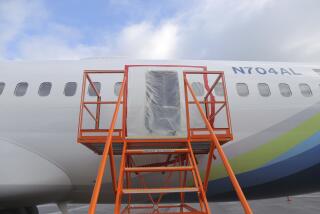Boeing’s 1980 Fuel Tank Study Draws Probe
- Share via
WASHINGTON — The Boeing Co. studied fuel tank problems in one of its jumbo jets in 1980--16 years before similar problems apparently contributed to the explosion of TWA Flight 800--but failed to give its report to safety investigators until this June.
Congressional investigators are probing why Boeing never told the National Transportation Safety Board that it had completed a report on center fuel tank overheating in its E-4B, the military version of the civilian 747 that went down over Long Island Sound in July 1996.
Safety board officials believe the report could have helped focus the TWA investigation on mechanical failure much earlier, and one senator argued that its conclusions could have helped prevent the tragedy if they had been released after a 1990 fuel tank explosion.
The board released a terse statement Friday expressing “dismay” and “displeasure” over Boeing’s failure to produce its study, and attorneys for families of the 230 people killed aboard TWA Flight 800 warned that the March 14, 1980, report is sure to resurface in their multimillion-dollar lawsuits against the manufacturer.
Boeing declined official comment. Sources said company officials have acknowledged that they should have produced the report earlier but have contended that it would not have affected the TWA Flight 800 investigation.
The 1980 Boeing report focused on one of the key issues that preoccupied Flight 800 investigators: the possibility that excess heat from the jet’s air-conditioning bay could create highly flammable fuel vapors in the central tank--and it even made one of the safety recommendations that the board issued in December 1997.
Sen. Charles E. Grassley (R-Iowa), chairman of a subcommittee that oversees airline disaster investigations, said Boeing was under a legal as well as moral obligation to produce the study after Flight 800 went down.
He said that if the company had volunteered its four-volume report after a center fuel tank explosion in a different kind of Boeing jet--a Philippines Airlines 737--killed eight people at the Manila airport in 1990, U.S. safety officials might have recommended changes that could have prevented the TWA tragedy.
“The government and the manufacturers need to have an ethic that overreporting is better than underreporting,” Grassley said. “This was too important to fall through the cracks.”
In recent months, the Office of Special Investigations of the General Accounting Office, which conducts probes for Congress, has interviewed more than a dozen Boeing employees from the civilian and military wings of the company, and more than a dozen federal employees of the Air Force and the NTSB. Sources say that the investigators have no evidence of any intentional cover-up at Boeing or at the Air Force, which commissioned the original report, but that Boeing officials admitted to the investigators that they should have produced the report earlier.
More to Read
Inside the business of entertainment
The Wide Shot brings you news, analysis and insights on everything from streaming wars to production — and what it all means for the future.
You may occasionally receive promotional content from the Los Angeles Times.










